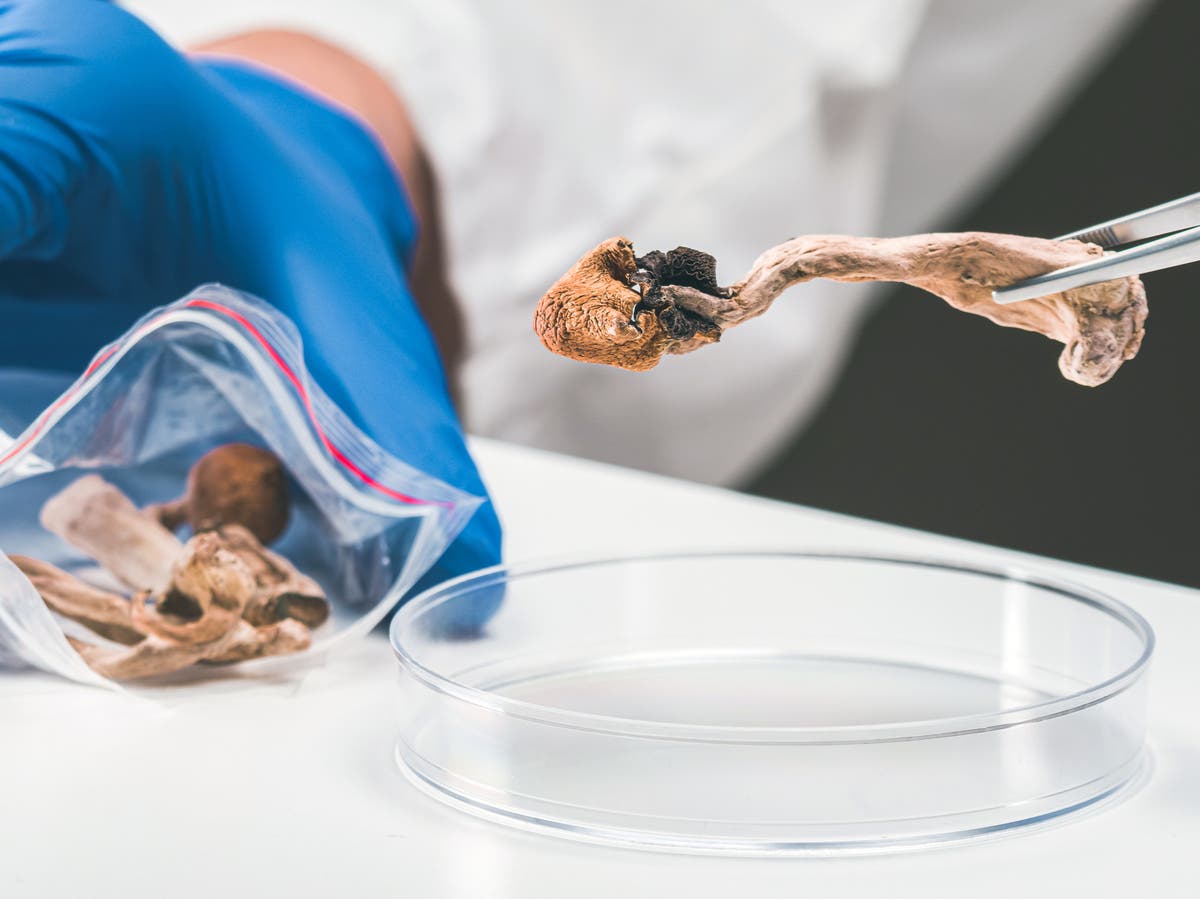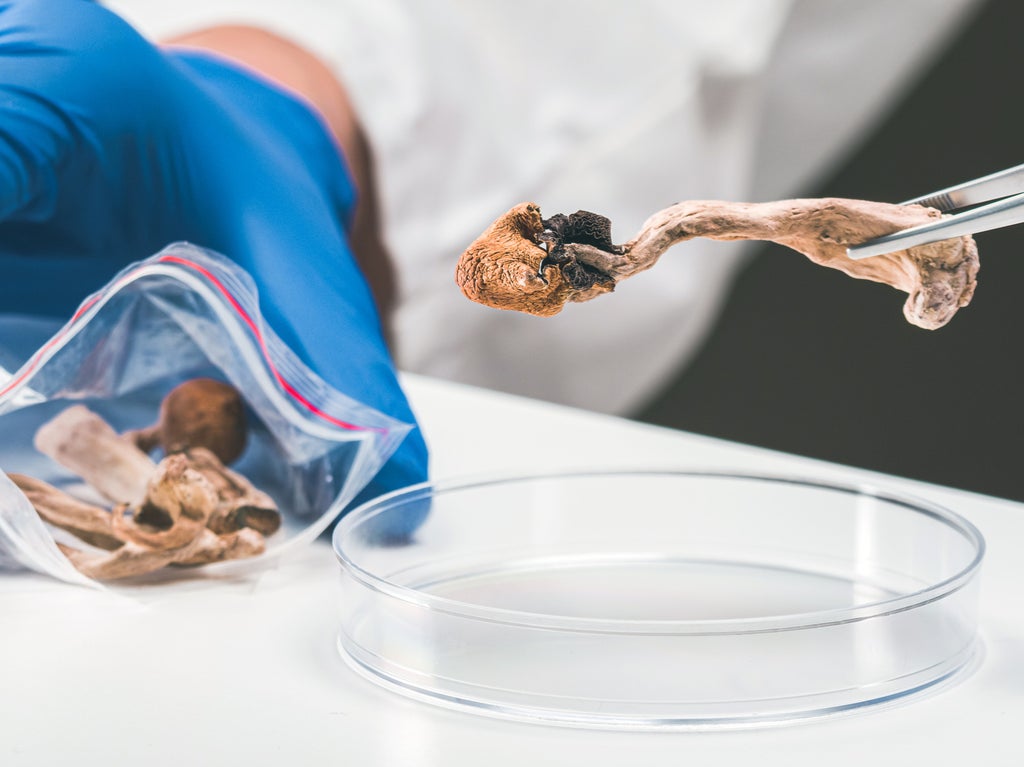Psychedelic compounds like LSD, ecstasy and psilocybin mushrooms have shown significant promise in treating a range of mental health disorders, with participants in clinical studies often describing tremendous progress taming the demons of post-traumatic stress disorder, or finding unexpected calm and clarity as they face a terminal illness.
But exactly how psychedelics might therapeutically rewire the mind remains an enigma.
A group of neuroscientists in London thought advanced neuroimaging technology that peered deep into the brain might provide some answers. They included 43 people with severe depression in a study sponsored by Imperial College London, and gave them either psilocybin, the active ingredient in magic mushrooms, or a conventional antidepressant; the participants were not told which one they would receive. Functional magnetic resonance imaging, which captures metabolic function, took two snapshots of their brain activity – the day before receiving the first dose and then roughly three weeks after the final one.
What they found, according to a study published last week in the journal Nature Medicine, was illuminating, both figuratively and literally. Over the course of three weeks, participants who had been given the antidepressant escitalopram reported mild improvement in their symptoms, and the scans continued to suggest the stubborn, telltale signs of a mind hobbled by major depressive disorder. Neural activity was constrained within certain regions of the brain, a reflection of the rigid thought patterns that can trap those with depression in a negative feedback loop of pessimism and despair.
By contrast, the participants given psilocybin therapy reported a rapid and sustained improvement in their depression, and the scans showed flourishes of neural activity across large swathes of the brain that persisted for the three weeks. That heightened connectivity, they said, resembled the cognitive agility of a healthy brain that, for example, can toggle between a morning bout of melancholia, a stressful day at work and an evening of unencumbered revelry with friends.
Although the authors acknowledged the limitations of the study, including its small size and short time frame, they said psilocybin appeared to have a “liberating” effect on the brains of people with severe depression.
When the researchers followed up six months later, many participants reported that the improvements to their depression had not subsided
“Psilocybin, it would seem, allows you to see things in an entirely new light, particularly when you have a psychotherapist who can help guide you through that experience,” said Richard Daws, a cognitive neuroscientist and a lead author of the study. “You can unpack difficult experiences that might define how you see the world, which is interesting because that’s exactly what traditional cognitive behavioural therapy is trying to do.”
Experts not involved with the study said that the results were not entirely surprising but that they provided a possible biological explanation for the anecdotal accounts about therapeutic breakthroughs with psychedelic medicine.
Patrick M Fisher, a neuroscientist at the Neurobiology Research Unit in Copenhagen, Denmark, who studies psilocybin’s effects on the brain, said the findings could help explain why study subjects in psychedelic research often report long-term relief from psychological ailments. “One or two doses of psychedelic drugs seem to impart lasting clinical benefits and changes in personality and mood, and that’s an unusual characteristic of drugs,” he said. “Although these brain imaging data are important for resolving the brain mechanisms that support these lasting changes, this study leaves prominent questions unanswered.”
Other researchers agreed, saying the results highlighted the need for further study. Dr Stephen Ross, associate director of the NYU Langone Center for Psychedelic Medicine, who has been studying the antidepressant effects of psilocybin on cancer patients, cautioned against drawing sweeping conclusions given the relatively brief monitoring period of participants’ brain activity.
“It’s a little bit like looking out into the universe with a telescope and seeing interesting things and then starting to build theories based on that,” he said. “This is an important contribution, though I’m more interested in what happens in three months or six months.”
A scientist measures micro doses of a magic mushrooms
(Getty/iStock)
A separate, smaller experiment that was included in the Nature Medicine paper appeared to support the notion that psilocybin therapy could provide enduring benefits. In that trial, 16 patients were recruited with the knowledge that they would receive psilocybin for their treatment-resistant depression. Brain scans taken a day after the final doses were administered showed similar results to the other study. And when the researchers followed up six months later, many participants reported that the improvements to their depression had not subsided.
“These results are very promising, but obviously no one should go out and try and procure psychedelics without speaking to a doctor or a therapist,” Daws said.
The Imperial College psilocybin research featured in Monty Wates’s compelling 2018 documentary Magic Medicine, currently screening on Netflix, which follows the heartbreaking journey of a group of severe depression sufferers who undergo the therapy – with mostly positive outcomes.
The field of psychedelic medicine is still in its infancy following a decades-long gap in research, a direct result of anti-drug policies that prevented most scientists in the United States from investigating mind-altering compounds. But as the stigma has faded and research funding has begun to flow more freely, a growing number of scientists have begun exploring whether such drugs can help patients suffering from a wide range of mental health conditions, including anorexia, substance abuse and obsessive-compulsive disorder.
Along with psilocybin, MDMA, popularly known as ecstasy, has been especially promising. A study last May in Nature Medicine found that the drug paired with talk therapy could significantly lessen or even eliminate symptoms of PTSD. Phase 3 clinical trials are now underway, and some experts believe the Food and Drug Administration could approve MDMA therapy for PTSD as soon as next year.
Depression remains one of most common and intractable mental health challenges in the United States, with an estimated 21 million adults reporting a major depressive episode in 2020, according to the National Institute of Mental Health. Although Prozac and other antidepressants known as SSRIs have been effective for many, they have significant side effects and the drugs do not work for everyone.
For that reason, the handful of small studies on psilocybin and depression have electrified mental health experts and patients.
This article originally appeared in The New York Times.







More Stories
New vaccine may hold key to preventing Alzheimer’s, scientists say
Just 1% of pathogens released from Earth’s melting ice may wreak havoc
Europe weather: How heatwaves could forever change summer holidays abroad